-
The Rebbe's Explanations and Special Addition to "The King in the Field" (14:34)
Rabbi Shmuel Butman (169)
-
Pulling from the Past to Fuel the Future: The Power of Teshuvah (49:33)
The Talmud teaches, “A baal teshuvah stands in a place where even the most righteous cannot stand.” What is teshuvah (repentance)? Is it just saying, “I’m sorry”? That’s hardly grand! Discover the power of teshuvah, Judaism’s gift of redemptive transformation. This lecture was delivered at the 15th annual National Jewish Retreat
Mrs. Dassie New (2)
-
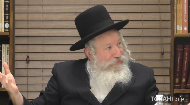 24:03
24:03
Teshuva in the Spirit of Ani Ledodi Vedodi Li (24:03)
Rabbi Aaron D. Gancz (4)
-
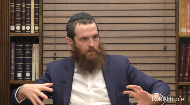 54:26
54:26
4) Is the Name "Rosh Hashanah" A Mistake? (54:26)
Series: Make next Year Your Best Year
Rabbi Yisroel Glick (57)
-
 33:28
33:28
Chassidus, Chayus, and Teshuva through Joy (33:28)
Rabbi Aaron D. Gancz (4)
-
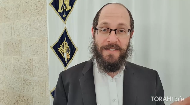 20:04
20:04
Using Elul to Discover Your Personal Potential (20:04)
This video is part of a series of live streams by the Rohr Jewish Learning Institute (JLI) to provide quality lectures during the worldwide COVID-19 lockdowns. Click here to see more.
Series: Live Social Media Streams
Rabbi Ari Shishler (9)
-
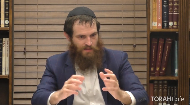 51:28
51:28
3) What Difference Does It Really Make? (51:28)
Series: Make next Year Your Best Year
Rabbi Yisroel Glick (57)
-
 7:18
7:18
The Secret Power of Rebuke (7:18)
Rabbi Shmuel Reichman (71)
-
 59:32
59:32
2) Are You the Problem? (59:32)
Series: Make next Year Your Best Year
Rabbi Yisroel Glick (57)
-
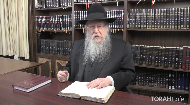 18:41
18:41
The Rebbe Reveals the Acronym for the Year 5781 (18:41)
Rabbi Shmuel Butman (169)
-
 51:55
51:55
1) The Power of Elul (51:55)
Series: Make next Year Your Best Year
Rabbi Yisroel Glick (57)
-
 6:24
6:24
True Marriage: Peering Through the Surface (6:24)
Rabbi Shmuel Reichman (71)
-
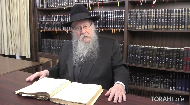 23:16
23:16
The Rebbe's Addition to "The King In the Field" (23:16)
Rabbi Shmuel Butman (169)
-
 24:57
24:57
Elul and the Thirteen Attributes of Mercy (24:57)
This video is an excerpt of a weekly Tanya class given by Rabbi Naftali Silberberg every Thursday night 9:00 PM at The Baal Shem Tov Library, 1709 ave J. For more information, visit: thebaalshemtovlibrary.com.
Series: Chassidic Philosophy with Rabbi Naftali Silberberg
Rabbi Naftali Silberberg (453)
-
 6:19
6:19
Can G-d Be Bribed? (6:19)
This video is an excerpt of a weekly Tanya class given by Rabbi Naftali Silberberg every Thursday night 9:00 PM at The Baal Shem Tov Library, 1709 ave J. For more information, visit: thebaalshemtovlibrary.com.
Series: Chassidic Philosophy with Rabbi Naftali Silberberg
Rabbi Naftali Silberberg (453)
-
 6:34
6:34
Willpower: Generating Momentum for Our Return (6:34)
Rabbi Shmuel Reichman (71)
-
 6:30
6:30
When the Broken Path Still Leads Home (6:30)
Rabbi Shmuel Reichman (71)
-
 7:14
7:14
If Only We Stopped Saying "If Only" (7:14)
What is more determinative of success, talent or determination and commitment?.
Rabbi Aryeh Weinstein (113)
-
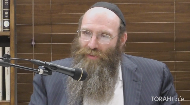 56:20
56:20
The Avodah of Chodesh Elul (56:20)
Rabbi Levi Kaplan (54)
-
 1:49
1:49
In the Open (1:49)
Are the Days of Awe a frightening time?.
Series: JLI Weekly Video
-
 1:02:32
1:02:32
Facing Our Creator: The Power of Elul Part 2 (1:02:32)
This text-based double session includes both learning with a study partner (chavrusa) as well as a lecture component with Rabbi Shais Taub. This classic, foundational discourse of the Alter Rebbe, Ani l Dodi, delves into the meaning of the month of Elul. The discourse is in Hebrew though knowledge of the Hebrew language is not required as everything is translated
Rabbi Shais Taub (115)
-
 23:51
23:51
Facing Our Creator: The Power of Elul Part 1 (23:51)
This text-based double session includes both learning with a study partner (chavrusa) as well as a lecture component with Rabbi Shais Taub. This classic, foundational discourse of the Alter Rebbe, Ani l Dodi, delves into the meaning of the month of Elul. The discourse is in Hebrew though knowledge of the Hebrew language is not required as everything is translated
Rabbi Shais Taub (115)
-
 8:10
8:10
The Kabbalah of Forgiveness Introduction (8:10)
In this introduction to his new series on “The Kabbalah of Forgiveness”, Dr. Henry Abramson provides a background for the book “Tomer Devorah”. Written by the Ramak, a well-known and prolific kabbalist, this work takes a uniquely mystical approach to the study of ethical development, known as Mussar
Series: The Kabbalah of Forgiveness
Dr. Henry Abramson (90)
-
 9:13
9:13
Being Judged Is a Compliment (9:13)
Rabbi Manis Friedman (248)
-
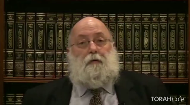 36:37
36:37
Do You Know How to Sing? (36:37)
Rabbi Simon Jacobson (149)
-
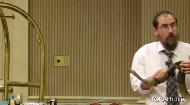 20:50
20:50
The Making of a Shofar (Workshop) (20:50)
Have you ever seen the making of a Shofar? Rabbi Baron takes you on a hands-on tour of the ins and outs of creating a real kosher shofar. This workshop took place at the 7th annual National Jewish Retreat. For more information and to register for the next retreat, visit: Jretreat.com.
Rabbi Hillel Baron (3)
-
 51:25
51:25
The Point of Return (51:25)
Do we really have to worry about that sweater that someone left in our house? Rabbi Avrohom Bergstein reviews the laws for lost objects and their sources in Torah. He brings in the Chassidic interpretation of this mitzvah and how to relate it to our service of Hashem and how we relate to our fellows.
Rabbi Avrohom Bergstein (32)
-
 2:11
2:11
Virgo (2:11)
Rabbi Ari Sollish continues his series on astrology with Virgo. Virgo is parallel to Elul when we prepare for the High Holidays with introspection and action to improve our behavior
Series: Judaism and Astrology
Rabbi Ari Sollish (35)
-
 40:04
40:04
Teshuva: Time Travel (40:04)
Change sins to merits with one simple discovery. Through teshuvah, repentence, we can lessen past sins and even change some to merits. Rabbi Pinchas Taylor shows how science is coming to support different approaches to time and space, which have always been known in Jewish mystical literature. ► Part 1.
Rabbi Pinchas Taylor (67)
-
 7:45
7:45
A Torah Exposition into the Number 1839 (7:45)
One of the most significant numbers in physics has a mysterious reappearance in numerous places in the Torah. In this brief segment, Rabbi Ginsburgh introduces a mystical application of modern science to Torah concepts.
Rabbi Yitzchak Ginsburgh (31)
-
 28:48
28:48
The Surprising Power of Repentance (28:48)
Does G-d really expect me to be perfect? What is my role in this world, and how can I perfect myself when I feel so flawed? This lecture was delivered at the 5th annual National Jewish Retreat. For more information and to register for the next retreat, visit: Jretreat.com.
Rabbi Yossi Shanowitz (1)
-
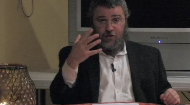 13:43
13:43
The Shofar: A Mystical Perspective (13:43)
Rabbi DovBer Pinson is a world-renowned scholar, author, thinker, and beloved spiritual teacher. Through his books, lectures, and consul he has touched and inspired the lives of thousands. Amongst his published works are: Reincarnation & Judaism: The Journey of the Soul
Rabbi DovBer Pinson (42)
-
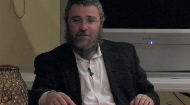 44:14
44:14
Elul: Endless Possibilities, Redemption of Imagination and Action (44:14)
Rabbi DovBer Pinson is a world-renowned scholar, author, thinker, and beloved spiritual teacher. Through his books, lectures, and consul he has touched and inspired the lives of thousands. Amongst his published works are: Reincarnation & Judaism: The Journey of the Soul
Rabbi DovBer Pinson (42)
-
 16:17
16:17
The Month of Elul (16:17)
Rabbi Shea Hecht is the chairman of the board of the National Committee for the Furtherance of Jewish Education (NCFJE) which is a multi-faceted charity that protects, feeds and educates thousands throughout the NY metro area and around the nation. For more information about NCFJE, check out www.ncfje.org.
Series: The Jewish Year
Rabbi Shea Hecht (20)
-
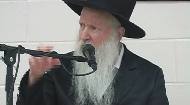 40:20
40:20
Five Acronyms of Elul (40:20)
Rabbi Yitzchak Ginsburgh uses hints within the name of the month of Elul to elucidate the inner meaning of this time period. .
Rabbi Yitzchak Ginsburgh (31)
-
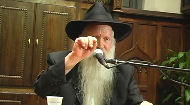 11:26
11:26
Becoming a Professional Believer (11:26)
Jews are called “Believers, sons of believers”, faith being their defining quality. This excerpt from a talk by Rabbi Ginsburgh describes your profession as a work of art that expresses your faith. .
Rabbi Yitzchak Ginsburgh (31)
-
 45:43
45:43
Insights in the Selichot Prayer (45:43)
This class analyzes the text of a unique prayer recited in the days preceding the High Holidays. Rabbi Yitzchak Ginsburgh explains the meaning of the words of the text and how they correspond to the Jewish year.
Rabbi Yitzchak Ginsburgh (31)



